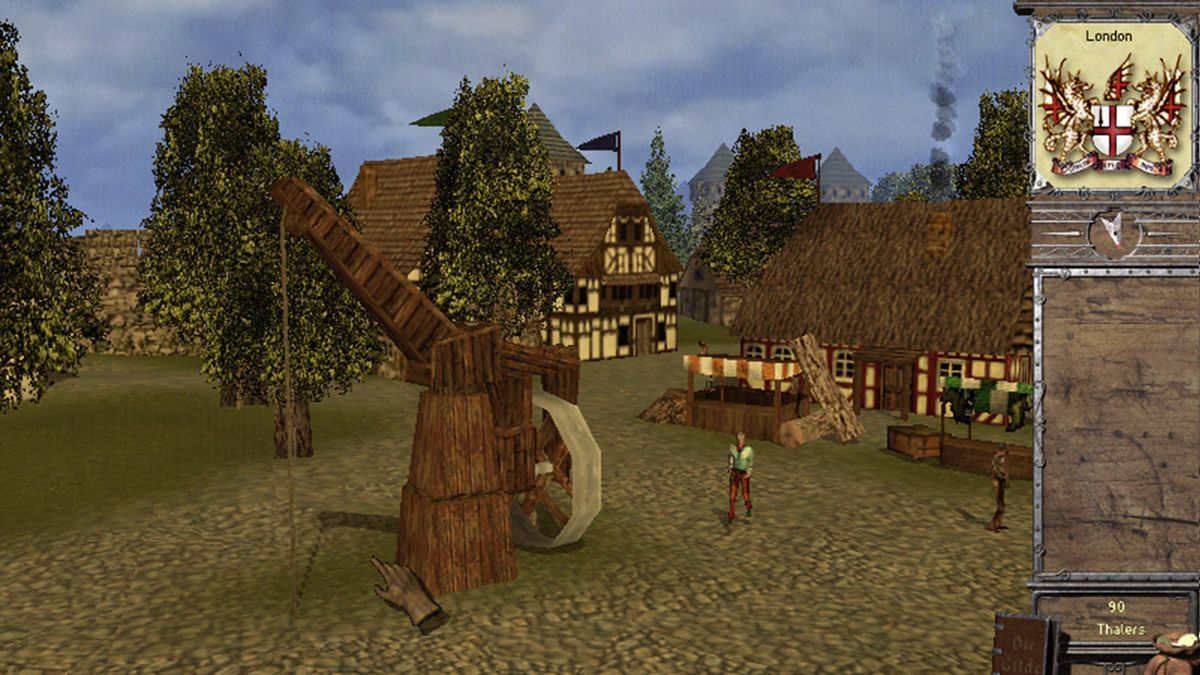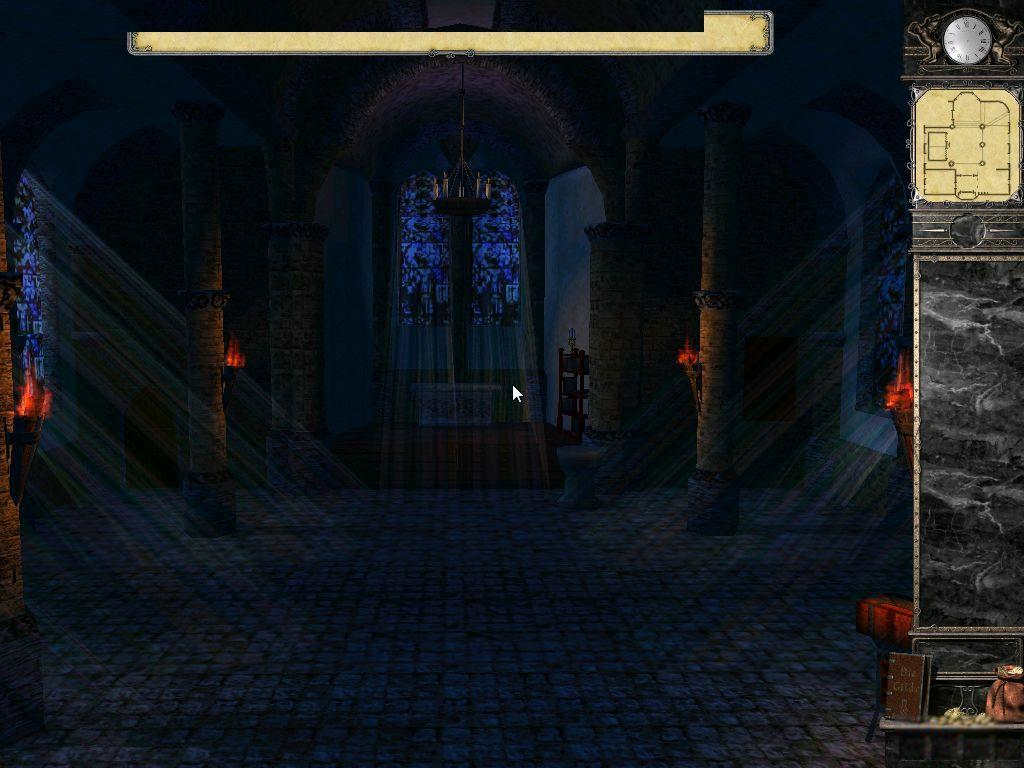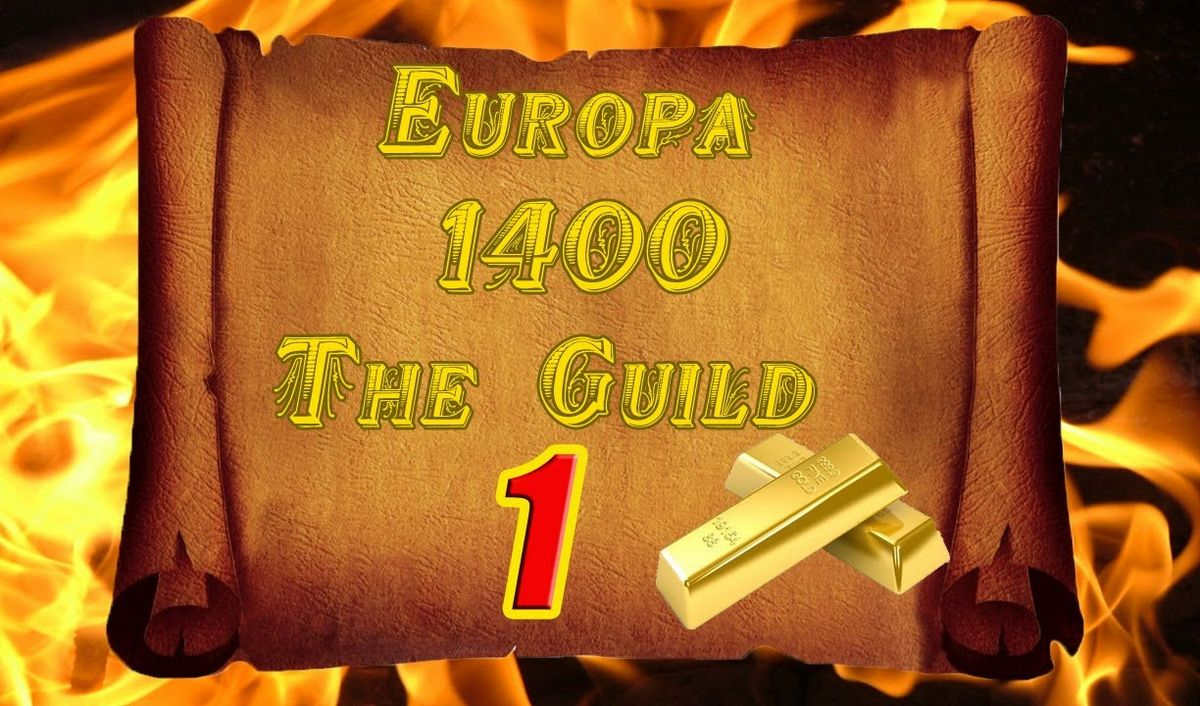
Europa 1400: The Guild is a strategic simulation game that takes place in the late Medieval Age of Europe. Developed by 4HEAD Studios and published by JoWood Entertainment, it was first released in Germany in 2002, followed by an English release soon after. Set against the backdrop of economic growth and political turmoil, players assume the role of a budding entrepreneur seeking to establish their own dynasty amidst fierce competition.
The game offers deep gameplay mechanics with multiple layers of strategy. Players will need to manage resources, negotiate alliances and trade deals with other guilds while keeping a close eye on their competitors. A successful business requires careful planning for production chains, managing employees and finances as well as engaging with local authorities.
With its rich historical setting, Europa 1400: The Guild provides plenty of opportunities for immersion. From building your own manufacturing empire to navigating the intricate web of politics among cities or even becoming mayor yourself – there’s never a dull moment in this game.
In this article, we’ll delve deeper into what makes Europa 1400: The Guild such an enduring classic among strategy games enthusiasts. From analyzing its gameplay mechanics to exploring the historical accuracy depicted within it – everything you need to know about why this title has stood tall over time will be discussed here. So sit back and prepare yourself for an epic journey through medieval Europe!
- The historical accuracy of Europa 1400: The Guild as a representation of medieval European trade and commerce
- Analyzing the gameplay mechanics and strategy involved in managing a successful guild in Europa 1400
- Exploring the different professions available to players in Europa 1400 and their impact on game progression
- Examining the social dynamics within the game, including political alliances and rivalries between guilds
- A comparative analysis of Europa 1400 with other games set in similar time periods, such as Crusader Kings or Civilization IV
- An overview of how modding communities have expanded on the original Europe 1400 experience over time
- The role that player choice plays within Europa 1400’s narrative structure, particularly regarding ethical decisions faced by characters throughout the game world
- Looking at how Europa 1400 has influenced later strategy games through its unique blend of economic management, diplomacy building, and character development systems
The historical accuracy of Europa 1400: The Guild as a representation of medieval European trade and commerce
This game offers an insightful glimpse into the complex world of trade and commerce during this time period while also providing hours of engaging gameplay.
The game’s historical accuracy can be seen in its attention to detail when it comes to trading goods such as textiles, spices, foodstuffs, amber or salt – all commodities that were highly sought after during this era. Additionally, players must navigate political relationships with other guilds and societies within their city-state while keeping an eye on taxes imposed by feudal lords. These mechanics are indicative of how medieval European economies operated.
Moreover, The Guild presents accurate depictions of urban life – from bustling marketplaces to crowded streets filled with people going about their daily lives. It also features realistic buildings architecture which reflects architectural styles prevalent at that time. Overall Europa 1400: The Guild provides valuable insight into medieval economics and society through its thoughtful representation thereof making it not only a fun but educational gaming experience for those interested in history and economics alike.
Analyzing the gameplay mechanics and strategy involved in managing a successful guild in Europa 1400

A successful guild will require careful planning and management of resources, as well as strategic decision-making when it comes to recruitment, resource allocation, and expansion.

One key gameplay mechanic is the need for balancing the various needs of the guild. Players must balance investments in production facilities with training and recruitment of new members and political maneuvering to gain favor with local nobles. Additionally, managing relationships with other guilds can be crucial – alliances can lead to powerful synergies while conflict may result in costly battles.
Another important aspect of Europa 1400: The Guild’s gameplay mechanics is its emphasis on role-playing elements. Players must take on different roles within their guild, such as master craftsman or treasurer, which come with unique responsibilities and abilities. Properly leveraging these roles can help maximize efficiency within the organization.
Overall, success in Europa 1400: The Guild requires deep understanding of both strategic management principles and historical context. By mastering these mechanics while navigating the game‘s complex economy and politics systems players can build a thriving medieval business empire that stands above all others!
Exploring the different professions available to players in Europa 1400 and their impact on game progression
One of the most interesting aspects of this game is its various professions, which play a crucial role in determining how successful players are in achieving their goals.
Players can choose from several professions, including blacksmiths, bakers, alchemists, lawyers, doctors, architects, merchants and much more. Each profession has its unique skills set that players must master to excel in it. For example, blacksmiths must learn forging techniques to create weapons while bakers require knowledge about baking bread and cakes for sale.
The impact of these different professions on gameplay progression cannot be overstated. Players who specialize in building structures will have an easier time constructing grand buildings such as churches or palaces; likewise focusing heavily on trade will boost profits but may lead to a rise in enemies along with power struggles between rival guilds.
In conclusion, Europa 1400: The Guild offers an immersive experience where each profession plays a vital role within gameplay progression. By mastering one’s chosen field or choosing to diversify across many disciplines – players can achieve great success both financially and politically – leading towards becoming powerful leaders within society’s strict hierarchy boundaries!
Examining the social dynamics within the game, including political alliances and rivalries between guilds
The game enables players to simulate political alliances and rivalries that were commonplace among guilds in Europe during the fifteenth century. Players are able to join different guilds, each with its own set of rules and regulations governing relationships between members.
In Europa 1400: The Guild, players must engage in diplomacy with other guild leaders, forging alliances or engaging in hostile encounters depending on their strategic goals. As a result, personal relationships become instrumental in determining the success or failure of any given player’s mission. This aspect of gameplay adds an extra layer of complexity and realism not typically found within games from this genre.
Political alliances and rivalries also come into play when establishing trade routes with other towns. Each town has its own set of economic interests which can be leveraged by building strong diplomatic ties with local merchants or politicians. In turn, these connections help establish a network that can be used to gain competitive advantages over rivals through exclusive access to certain goods or services.
Overall, Europa 1400: The Guild is an excellent example of how games can offer insight into historical events while also providing hours upon hours worth of entertainment value for fans looking to explore dynamic social interactions within a virtual world setting.
A comparative analysis of Europa 1400 with other games set in similar time periods, such as Crusader Kings or Civilization IV
Unlike other popular titles such as Crusader Kings or Civilization IV, Europa 1400 offers a richly detailed view of life in late medieval Europe. Players are tasked with running their own business and navigating the complex political landscape of the time.
One key difference between Europa 1400 and similar games is its focus on economics rather than warfare or diplomacy. While players can engage in combat and build alliances with other factions, much of their success hinges on managing resources effectively and making smart business decisions. This emphasis on commerce sets Europa 1400 apart from other strategy games that prioritize military conquest.
Another notable feature of Europa 1400 is its attention to detail when it comes to historical accuracy. From clothing styles to architectural design, every aspect of the game’s setting is carefully researched and recreated for an immersive experience. This level of authenticity makes it easy for players to feel fully immersed in the world they’re playing in.
Overall, while there are certainly similarities between Europa 1400: The Guild and other medieval-themed strategy games like Crusader Kings or Civilization IV, this title offers a unique perspective thanks to its focus on economics and commitment to historical accuracy. Whether you’re interested in exploring life as a merchant during this fascinating period in history or simply looking for something new within the genre, Europa 1400 is definitely worth checking out.
An overview of how modding communities have expanded on the original Europe 1400 experience over time
Since its release, the modding community of this game has been continuously growing and expanding on the original gameplay experience. Modders have offered players an incredible amount of content that adds new features and enhances existing ones.
One significant expansion to the Europa 1400 experience came in the form of custom maps created by modders. These maps add entirely new regions to explore, trade in, and conquer for players who want more variety in their gameplay scenery. Alongside these maps comes a plethora of unique buildings, resources and characters which help make each region feel different from one another.
Several mods also focus on improving mechanics such as AI behavior or economics within Europa 1400: The Guild’s world. For instance, some mods add more complex trading systems or adjust pricing algorithms so that they better match real-world historical data from Europe during this period.
Overall, it can be concluded that modding communities have significantly expanded on the original Europa 1400 experience over time through various modifications such as custom maps that add new locations with unique buildings/resources/characters; improvements made to AI behavior/economics mechanics resulting in a better overall gaming experience for gamers worldwide!
The role that player choice plays within Europa 1400’s narrative structure, particularly regarding ethical decisions faced by characters throughout the game world
Throughout their journey, players are faced with various ethical decisions that can have significant consequences on both their character and the world around them.
The game places great emphasis on moral dilemmas encountered by players as they navigate through its intricately designed game world. One key example of this is seen when characters are required to make difficult decisions regarding alliances and friendships within the guild hierarchy. These choices can ultimately determine whether or not a player’s character becomes a respected member or an outcast within the guild.
Furthermore, ethical considerations extend beyond just interpersonal relationships, as players must also grapple with questions related to business practices and political intrigue. Decisions made during these moments have far-reaching effects that impact everything from individual quests to regional economies.
Player choice remains central to Europa 1400: The Guild’s overall narrative structure, providing an immersive experience for gamers seeking rich storytelling along with engaging gameplay mechanics. It is these nuanced ethical quandaries that elevate this classic title into one of gaming history’s most beloved franchises – all while delivering complex themes and thought-provoking content unlike any other gaming experience available today.
Looking at how Europa 1400 has influenced later strategy games through its unique blend of economic management, diplomacy building, and character development systems
One of the key features of this game is its unique blend of economic management, diplomacy building, and character development systems. These aspects are intertwined with one another to create an immersive experience for players.
The economic management system in Europa 1400 allows players to manage their own business empire. Players must balance income and expenses while also managing resources such as raw materials and labor costs. This system requires strategic planning and decision making skills as players navigate various market trends throughout Europe during the late Middle Ages.
Diplomacy building plays a crucial role in Europa 1400 as well since it determines how other characters interact with the player’s guild. This involves forming alliances, negotiating deals, and even engaging in political intrigue to maintain power within society.
Finally, character development plays a critical role in Europa 1400 by allowing players to customize their characters’ abilities and attributes through skill trees. These skills can be used to improve both personal performance as well as the success of their businesses or political endeavors.
Overall, Europa 1400’s influence on later strategy games lies within its innovative blend of these three core elements – economics management, diplomacy building, and character development – that created an immersive experience for gamers who crave greater depth than traditional real-time-strategy games offer.

In conclusion, Europa 1400: The Guild is a remarkable game that offers players an immersive experience in the world of medieval trade and commerce. With its complex economic simulation, diverse range of characters and activities, and rich historical detail, the game provides a challenging but rewarding gameplay experience for those willing to invest time and effort into mastering its intricacies.
The attention paid to historical accuracy in terms of setting, clothing, architecture, language used by NPCs etc., alongside its vast technological advancements makes it stand apart from other games in the genre. The depth of customization options available in various aspects including character creation/customization , business establishments management among others adds another layer of immersion for players.
Overall, Europa 1400: The Guild is highly recommended for gamers interested in history or economics who are looking for a challenging yet entertaining gaming experience that rewards strategy and careful decision-making. It remains one of the most beloved medieval trading simulator games ever created with an impressive legacy still attracting new fans over two decades since release.
Read More:- Conquer the World: Play Europa Universalis III and Rule as a Mighty Empire! (69 characters).
- Conquer Ancient Rome with Europa Universalis: Rome – Vae Victis Expansion Pack! (68 characters).
- Experience Epic Battles and Adventure in Guild Wars: Your Guide to the Ultimate Gaming Experience!.
- Experience the Power of Trade with Patrician III: Rise of the Hanse Game – A Thrilling Adventure!.
- Conquer Medieval Europe with Medieval II: Total War Kingdoms – A Strategic Gaming Masterpiece.
- Conquer the Seas and Rule the Land with Medieval: Total War – Viking Invasion Game!.
- Unleash Your Inner Warrior: Explore the Epic World of Guild Wars Eye of the North.